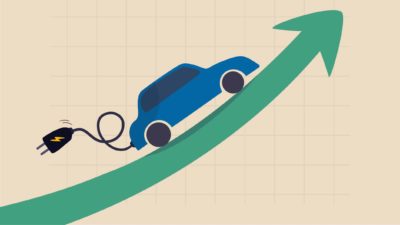This article was originally published on Fool.com. All figures quoted in US dollars unless otherwise stated.
Apple (NASDAQ: AAPL) gets the world's attention when it holds its developers' conferences, as consumers, suppliers, and tech professionals all look forward to the latest innovations from the iPhone maker. Yet while many pay the closest attention to the latest product releases, the announcement on Monday of its Apple Pay Later service sent shockwaves across the fintech space.
Buy now, pay later (BNPL) specialists like Affirm Holdings (NASDAQ: AFRM) were the most obvious targets of Apple's move. Indeed, Affirm's stock fell 5.5% on Monday, with much of the decline coming after the conference announcement. However, Apple Pay Later further cemented a key partnership between the technology pioneer and two leading players in the financial industry, and that could pay big benefits for them for years to come.
Apple goes its own way
Apple announced that its new iOS 16 operating system software includes a new feature within the Apple Wallet. Apple Pay Later will provide the same flexibility that customers have come to expect from BNPL services from competing providers.
In particular, with Apple Pay Later, users in the U.S. will be able to take purchases for which they use the Apple Pay function in Wallet and split them into four equal payments spread out over six weeks. Apple will charge 0% interest and won't add any fees of its own.
The drop in Affirm's stock price in response suggests that, at least some investors had hoped that Apple would choose to go the partnership route rather than releasing its own BNPL program. The announcement last summer that Amazon.com had chosen Affirm as its BNPL partner showed just how valuable the e-commerce behemoth believed the rising fintech's offering was. With Affirm users showing a demographic skew toward younger shoppers, investors hoped that Apple would come to the same conclusion that Amazon did and work with Affirm, rather than against it.
How Mastercard and Goldman Sachs could win from Apple Pay Later
Despite the hopes of Affirm shareholders, Apple Pay Later wasn't a big surprise. Nearly a year ago, reports surfaced that Apple was working with key partners to develop its own BNPL service. And now that the news is out, it's another victory for those partners: Mastercard (NYSE: MA) and Goldman Sachs (NYSE: GS).
Mastercard stands to benefit from Apple Pay Later because Apple is using Mastercard's payment network to handle installment payments under the program. Mastercard has fought hard to distinguish itself from its larger archrival, Visa. Cementing a relationship that started when the iPhone maker chose Mastercard for its Apple Card will further boost the No. 2 payment-network provider's reputation among consumers.
Meanwhile, although the release didn't specifically mention Goldman, the Wall Street banking giant is likely to be the lender behind the short-term installment loans within the BNPL program. Goldman is the issuing bank for Apple Card, and its decision to work more closely with Apple came at the same time that it chose to move aggressively into the consumer-banking side of the business with its Marcus online bank.
Will Apple Pay Later be a hit?
Both Goldman and Mastercard are large enough that the Apple Pay Later news didn't have any discernible impact on their stock prices. To reap the financial rewards of Goldman's and Mastercard's expanded partnership with Apple, Apple Pay Later will have to prove it can compete effectively with Affirm and its disruptive BNPL peers.
One key to Apple Pay Later's success will be in its execution. Looking closely at the release, users will be able to apply for Apple Pay Later when they use Apple Pay to check out, but that's no guarantee of acceptance. How strict Goldman proves to be with its underwriting could be a major factor in how consumers view Apple Pay Later and how profitable it will be for both the bank and Mastercard, as payment-network provider.
Moreover, Apple Pay Later is relatively inflexible, only offering a single repayment option. Many shoppers like other BNPL providers' wider array of schedules for making payments, although consumer advocates have criticized the higher costs in fees and interest charges that some of them involve.
Nevertheless, being associated with Apple's ecosystem could have long-term benefits for Mastercard and Goldman Sachs. The strength of the two financial giants' underlying businesses makes Apple Pay Later an added bonus opportunity to boost their growth.
This article was originally published on Fool.com. All figures quoted in US dollars unless otherwise stated.









